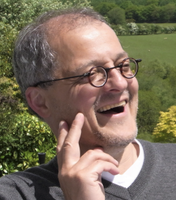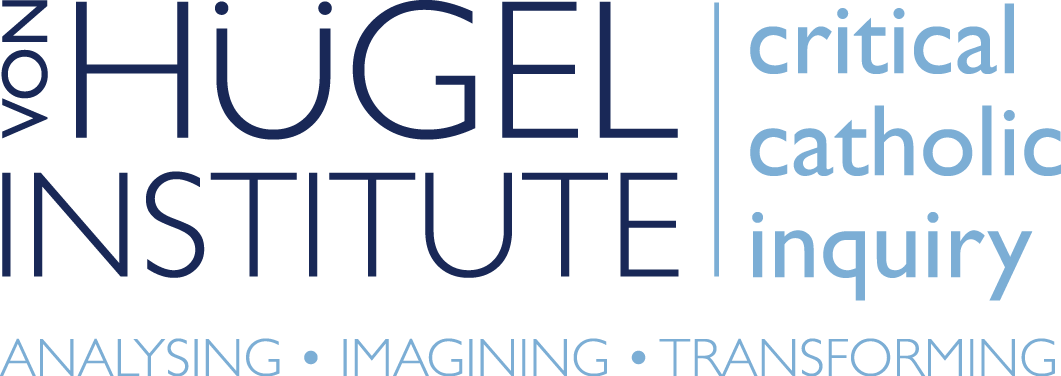Biography
Johannes Hoff was appointed VHI Senior Research Associate in 2019. Since September 2020 he is Full Professor at the Institute of Systematic Theology of the University of Innsbruck (Austria) in the tradition of Karl Rahner. Prior to this he was Professor of Philosophical Theology at Heythrop College, University of London, and at St David’s University of Wales (previously University of Wales, Lampeter), and Assistant Professor at the Faculty of Catholic Theology at the Eberhard Karls University of Tübingen.
His first academic monograph appeared under the title Spiritualität und Sprachverlust in 1999 and engaged with the theological implications of the work of Jürgen Habermas, Jacques Derrida, Michel Foucault, and Michel de Certeau. His second monograph on Nicholas of Cusa appeared under the title Kontingenz, Berührung, Überschreitung in 2007. Hoff’s first English speaking monograph, The Analogical Turn: Rethinking Modernity with Nicholas of Cusa (2013), brought his hitherto separate research projects on critical theory and the Renaissance transition to modernity together. In this book, Hoff shows how Cusa developed an early response to the uncritical celebration of mathematically generated ‘pictures of the world’ in early modern art and science, and the related modern obsession with immersive virtual spaces.
Many of his later publications emerged out of his collaboration with representatives of contemporary art. In his German monograph Verteidigung des Heiligen. Anthropologie der Digitalen Transformation of 2021, Hoff has presented a first synthesis of his most recent research on digitalization. According to Hoff, the digital transformation represents the greatest rupture of civilization since the Axis period of world history, in which the religious and philosophical traditions of the world history originated (around 500 B.C.): "Everyone knows today what the greatest threat to humanity is: the economically caused and technically accelerated devastation of biodiversity and the accompanying ecological climate change. The parallel digital transformation provokes an analogous threat: the economically caused and technically accelerated devastation of spiritual diversity and the accompanying spiritual climate change." This challenge, according to Hoff, requires us to revise the theological background assumptions that made our modern view of humanity seem plausible in the wake of the media technological innovations of the Renaissance, and to recover the spiritual potentials that distinguish humans from computing machines and mark them as intellectually gifted, personal beings.
Against this background, the Austrian Science Fund (FWF) granted the research project "4e Cognition in Theological Anthropology" proposed by Johannes Hoff in collaboration with Enrico Grube, which started in September 2023. The project explores the significance of the body / lived-body problem (Körper-Leib-Problem) for Christian doctrine from a historical and systematic point of view, with special emphasis on the doctrine of redemption and the patristic doctrine of the deification of man (theosis). In doing so, the results of contemporary phenomenology of the body and the neurobiological concept of embodied intelligence will enable a reorientation of Christian anthropology in the light of its historical sources. Part of this research is Hoff's research cooperation with the "Institute for Information Systems & Society" at the Vienna University of Economics and Business Administration.
Research
- Digitisation – ‘Artificial Intelligence’ – History of Technology
- Anthropology in a Post-digital Age
- Post-modernity, Hermeneutics, and Critical Theory
- Politics of Friendship
- Philosophical Mysticism
- Iconicity, Art and Religion
- Sacramentality and Ecclesiology
- Christology
- Thomas Aquinas
- Nicholas of Cusa and the Early Renaissance
- German Idealism and Early Romanticism
- Ressourcement Theology
Publications
Books
- Verteidigung des Heiligen. Anthropologie der Digitalen Transformation Freiburg - Basel - Wien, Herder 2021.
- The Analogical Turn. Re-thinking Modernity with Nicholas of Cusa, Grand Rapids, MI: Eerdmans Publishing Company, 2013.
- Kontingenz, Berührung, Überschreitung. Zur philosophischen Propädeutik christlicher Mystik nach Nikolaus von Kues, Freiburg/Br.: Alber Karl, 2007.
Selected Articles and Book Chapters
-
“Enlightenment Now! Overcoming the Functional Cognitivism of the Kantian Tradition,” Philosophy, Theology and the Sciences 11, 2025, 181-207 https://www.mohrsiebeck.com/artikel/enlightenment-now-101628ptsc-2024-0015/
-
“The Gift of Intelligence and the Sacramentality of Real Presence. Overcoming the Datjaist Metaphysics of Modern Cognitivism,” Modern Theology 2024, 921-947. https://doi.org/10.1111/moth.12940
-
Amirhossein Sanayei & Johannes Hoff, "Weisheit des Nichtwissens. Interview on Nicholas of Cusa (persisch), Humanities Review 3/4 (March 2024), 1-22 (https://www.goodreads.com/book/show/6139098)
-
Sakramentaler Realismus nach dem Ende des Gutenbergzeitalters. Christsein in einer postdigitalen Welt. In: Communio. Internationale Katholische Zeitschrift 3/51 (2022), 238 - 260. (https://www.herder.de/communio/hefte/archiv/51-2022/3-2022/ )
-
Zur Wiederentdeckung des Heiligen. Theologie nach der digitalen Transformation.In: Freiburger Zeitschrift für Philosophie und Theologie 69/1 (2022), 122 - 150. (https://www.unifr.ch/fzphth/de/nummern/69-2022-1.html)
-
Why we need Nicholas of Cusa after the Representationalist Delusion of Modern Philosophy and Theology. In: Moschini, Marco; Peroli, Enrico (Hrsg.): Why we Need Cusanus / Warum wir Cusanus brauchen. Münster: Aschendorff. 2022, 91 - 120.
-
Die kosmische Seinsfülle des großen Gegenüber. Anarchische Nachgedanken zu den heidnischen Dufnoten chistlicher Rauchopfer. In: Ramb, Martin W.; Valentin, Joachim; Wucherpfennig, Ansgar; Zaborowski, Holger (Hg.): Die anarchische Kraft des Monotheismus. Eckhard Nordhofens »Corpora« in der Diskussion. Freiburg i. Br. - Basel [u.a.]: Herder. 2021, 87 - 97.
-
Digital Metrics in the Age of Online Culture Wars. Policies of Praise and the Quest for Democratisation. In: Freiburger Zeitschrift für Philosophie und Theologie 67/1 (2020), 135 - 148. (https://www.unifr.ch/fzphth/de/nummern/67-2020-1.html)
-
Rückkehr zur Wirklichkeit. Wissenschaft und Spiritualität nach der Wiederentdeckung unserer leiblichen Existenz. In: Reiner, Frey: Meditation und die Zukunft der Bildung: Spiritualität und Wissenschaft. Weinheim: Beltz Juventa 2020, 65 - 107.
- 'Transhumanismus als Symptom symbolischer Verelendung. Zur anthropologischen Herausforderung der Digitalen Revolution', in: Herzberg, Stephan, Watzka, Heinrich (eds), Schöne neue Welt, oder was kommt nach dem Menschen?, De Gruyter: Berlin – New York, 2020 (DOI) (https://www.degruyter.com/document/doi/10.1515/9783110691047-013/html)
- 'Mystagogische Zugänge zur Kirche als Leib Christi. Certeaus taktische Re-lektüre von Corpus Mysticum und das Vermächtnis Henri de Lubacs', in Bauer, Christian; Sorace, Marco A. (eds), Gott, anderswo? Theologie im Gespräch mit Michel de Certeau, Mainz: Matthias Grünewald, 2019, 249-286.
- 'Iconicity and the Anamorphosis of Social Space. Retrieving Nicholas of Cusa’s Political Pneumatology', in: Vergauwen, Guido; Steinbruger, Andreas (eds), Veni, Sancte Spiritus! Theologische Beiträge zur Sendung des Geistes. Contributions Contributions to the Mission of the Spirit: Fs. Barbara Hallensleben, Münster: Aschendorff, 2018, 424-470.
- The Eclipse of Sacramental Realism in the Age of Reform. Re-thinking Luther's Gutenberg Galaxy in a Post-Digital Age, New Blackfriars, 2018.Mystagogische Zugänge zur Kirche als Leib Christi: Certeaus taktische Re-lektüre von Corpus Mysticum und das Vermächtnis Henri de Lubacs. In: Bauer, Christian, Sorace, Marco A., (eds.) Gott, anderswo?: Theologie im Gespräch mit Michel de Certeau, Mainz: Matthias Grünewald, 2017.
- Mystagogy Beyond Onto-Theology: Looking Back to Post-Modernity with Nicholas of Cusa. In: Moritz, Arne, (ed.) A Companion to Nicholas of Cusa. Leiden: Brill, 2017.Diesseits von Theismus und Pan(en)theismus: Orthodoxie in einer Post-digitalen Welt. In: Nitsche, Bernhard, Stosch, Klaus von, Tatari, Muna, (eds.) Gott – Jenseits von Monismus und Theismus?, Paderborn: Schöningh, 2016.
- Liturgical Turn: Gottesrede in einer post-digitalen Welt. In: Viertbauer, Klaus, Schmidinger, Heinrich, (eds.) Glauben Denken : zur philosophischen Durchdringung der Gottrede im 21. Jahrhundert, Darmstadt: WBG, 2016: pp. 61-80.
- The Visibility of the Invisible: the Vision of Space from Nicholas of Cusa to Alfred Hitchcock. In: Dobner, Heidemarie, (ed.) (UN)sichtbar: Erklärungsmuster um die Welt heute zu verstehen. Berlin/Boston: De Gruyter, 2015 pp. 20-31.
- (With Hampson, Peter) Nicholas of Cusa: A Pre-modern Post-modern reader of Shakespeare. In: Lehmann Infeld , Zoë, Hampson, Peter, Milbank, Alison, (eds) Theology and Literature in Post-modernity. London - New York: T&T Clark, 2015: pp. 115-137.
- Heaven, Hell, and Purgatory. Dante's Comedy and the Forgotten Truth of Apocalyptic Dreamworlds. In: Ambrožič, Mara, Njami, Simon, (eds.) The Divine Comedy Revisited by Contemporary African Artists. Berlin: Kerber Verlag, 2014: pp. 66-81.
- The Visibility of the Invisible in Nicholas of Cusa, in Nelstrop, Louise, Podmore, Simon (eds), Between Christian Mysticism and Incarnational Theology: Transcendence and Immanence. Oxford: Ashgate, 2013, 47-68.
- Nikolaus von Kues (1401-1464). In: Hoff, G, N, Kortner , U. H. J., (eds.) Arbeitsbuch Theologiegeschichte: Diskurse. Akteure. Wissensformen. Band 1: 2. Bis 15. Jahrhundert. Stuttgart: Kohlhammer, 2012, 359-378.
- Leben in Fülle. Schlingensiefs Dekonstruktion der (Post-)Moderne, in Gaensheimer, Susanne (ed.), Deutscher Pavillon 2011. 54. Internationale Kusntaustellung La Biennale Di Venezia. Venedig: Kiwi, 2011, 213-223.
- The Rise and the Fall of the Kantian Paradigm of Modern Theology. In: Candler, Peter, (ed.) The Grandeur of Reason: Religion, Tradition and Universalism. London: SCM Press, 2010, 167-196.
- Das Paradox des Glaubens und der Holzweg moderner Entscheidungslogik. Kierkegaards Lektüre von Genesis 22 und ihre Wirkungsgeschichte von Heidegger bis Derrida und darüber hinaus. (The Paradox of Faith and the Dead End of the Modern Logic of Decision Making: Kierkegaard’s reading of Genesis 22 and its History of Reception from Heidegger to Derrida and beyond), in Hoping, H, Knop , Julia, Bohm, Thomas, (eds) Die Bindung Isaaks. Stimme, Schrift, Bild. Paderborn: Schoeningh Ferdinand GmbH, 2009, 239-256.
- Das Subjekt entsichern. Zur spirituellen Dimension des Subjektproblems angesichts der Dekonstruktion des cartesianischen Wissenschaftsparadigmas, in Tod des Subjekts? Poststrukturalismus und christliches Denken. Innsbruck – Wien: Tyrolia, 2005, 213-242.
- Philosophie als performative Praktik. Spuren cusanischen Denkens bei Jacques Derrida und Michel de Certeau, in Schwaeter, Harald, Reinhardt, Klaus, (eds) Cusanus-Rezeption in der Philosophie des 20. Jahrhunderts. Regensburg: Roderer, 2005, 93-120.
- Dekonstruktive Metaphysik. Der Beitrag der Dekonstruktion zu Erschließung des Archivs negativer Theologie, in Zellinger, Peter, Flatscher, Matthias (eds), Kreuzungen Jacques Derridas. Geistergespräche zwischen Philosophie und Theologie, Wien: Turia & Kant, 2004, 138-168.
- Theologie nach dem Ende der 'Postmoderne'. Die Bedeutung Michel Foucaults für die diskursanalytische Grundlegung des Glaubens, in Bauer, Christian, Hölzl, Michael (eds), Gottes und des Menschen Tod? Die Theologie vor der Herausforderung Michel Foucaults, Mainz: Matthias-Grünewald-Verlag, 2003, 79-104.


